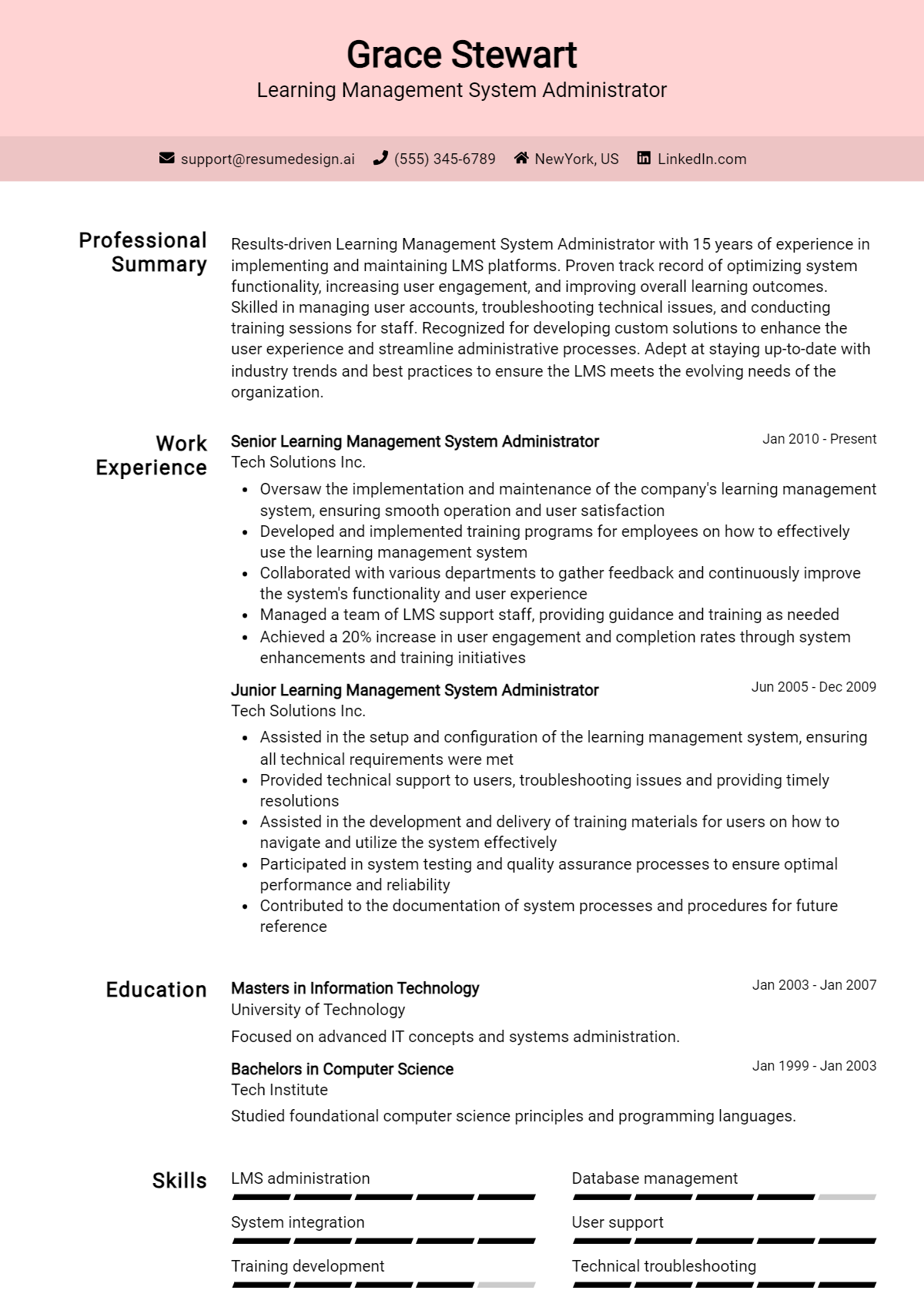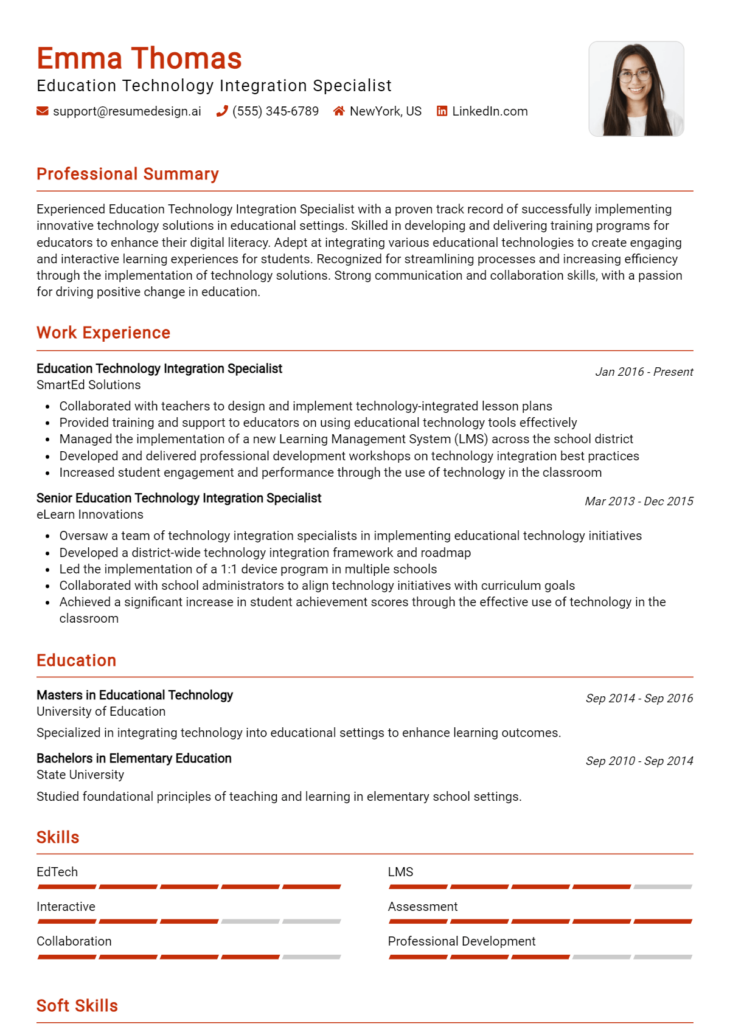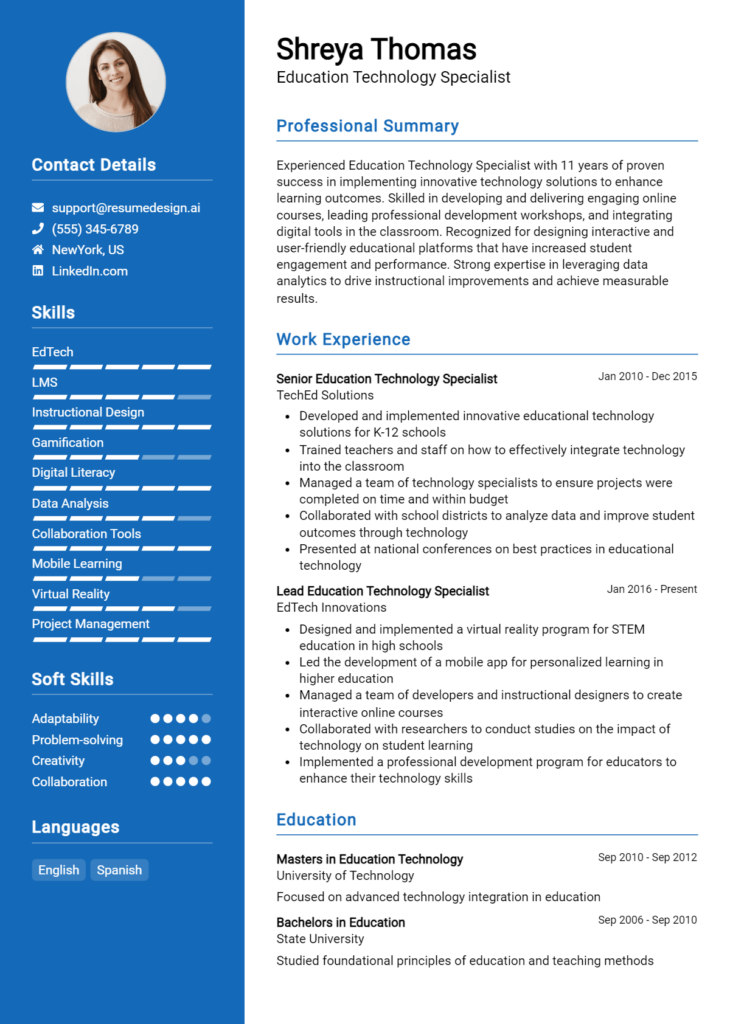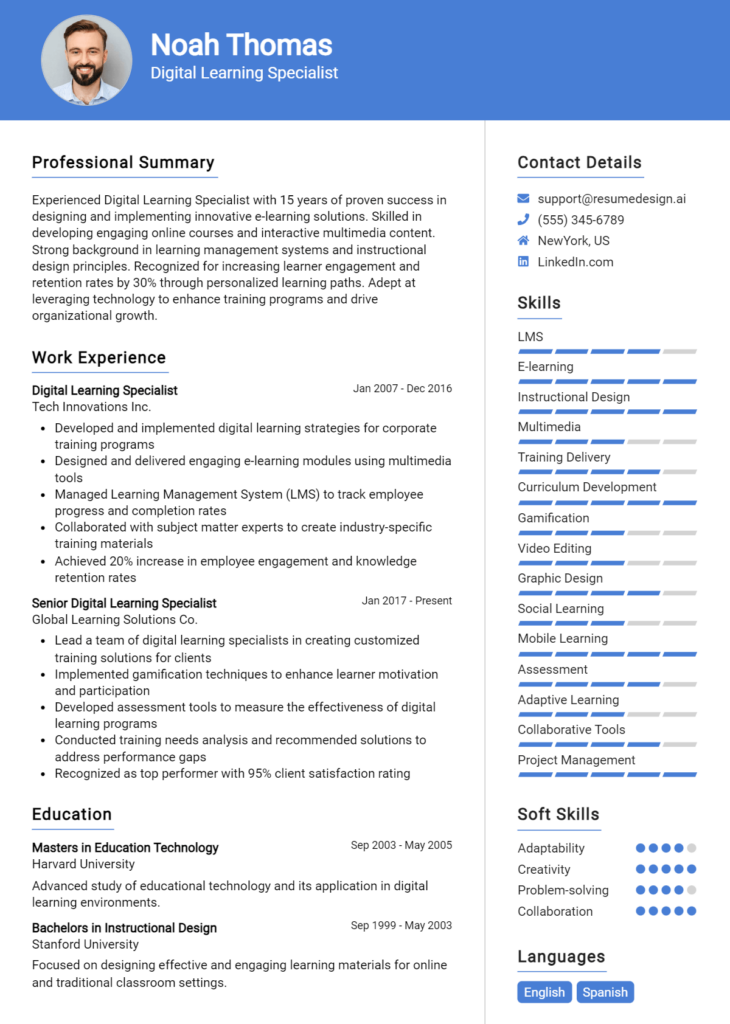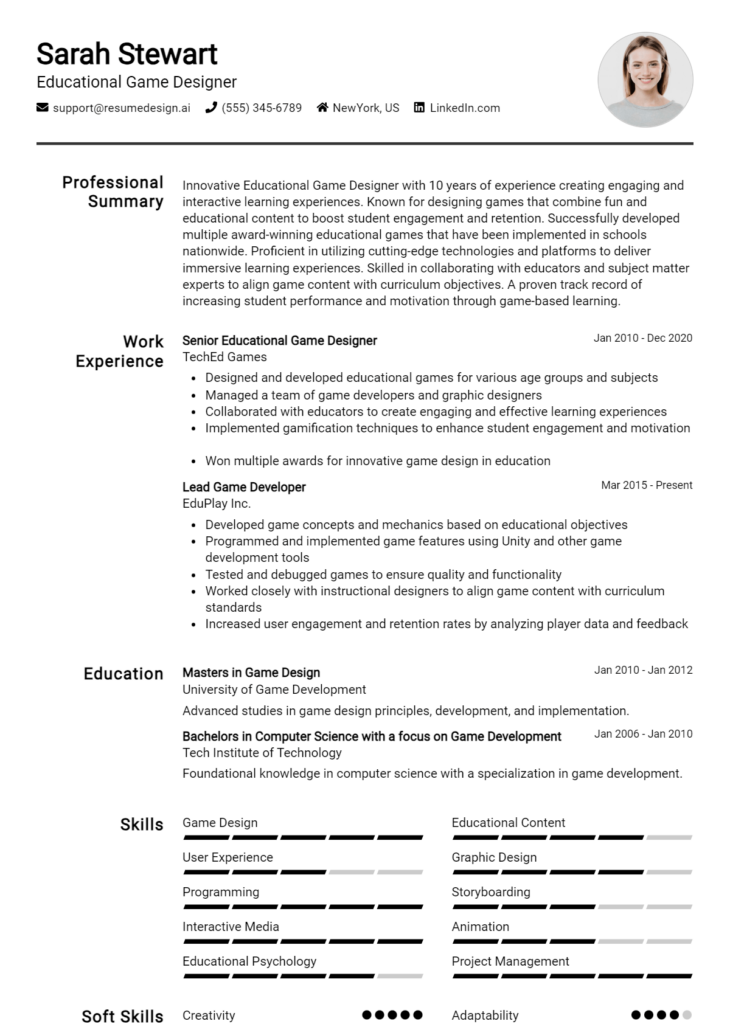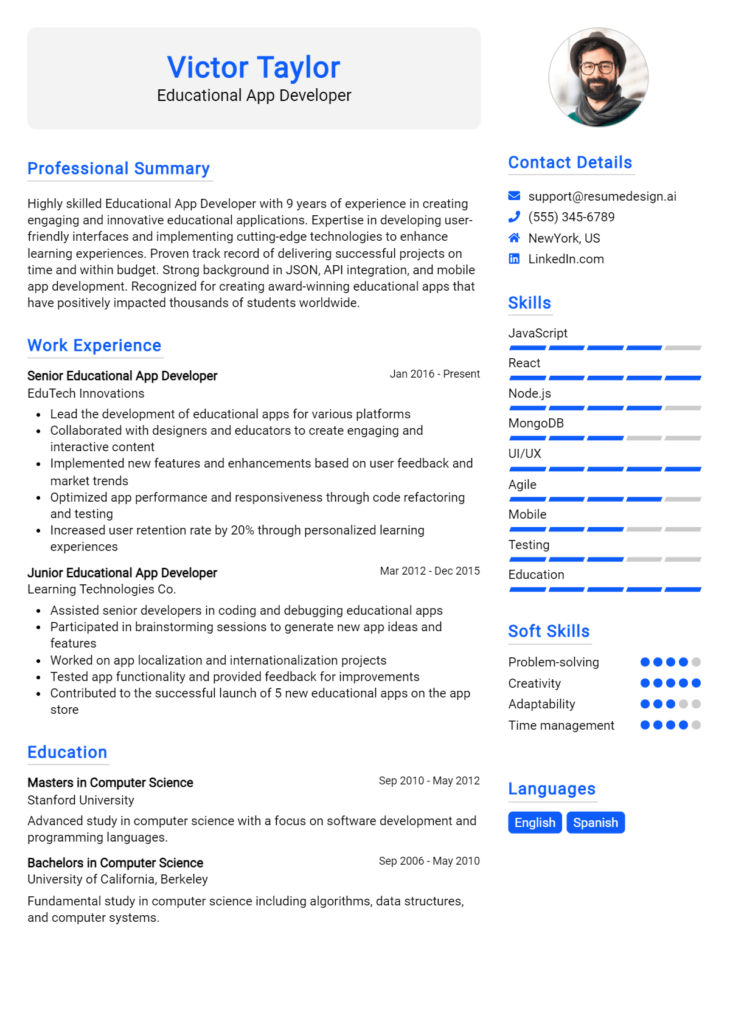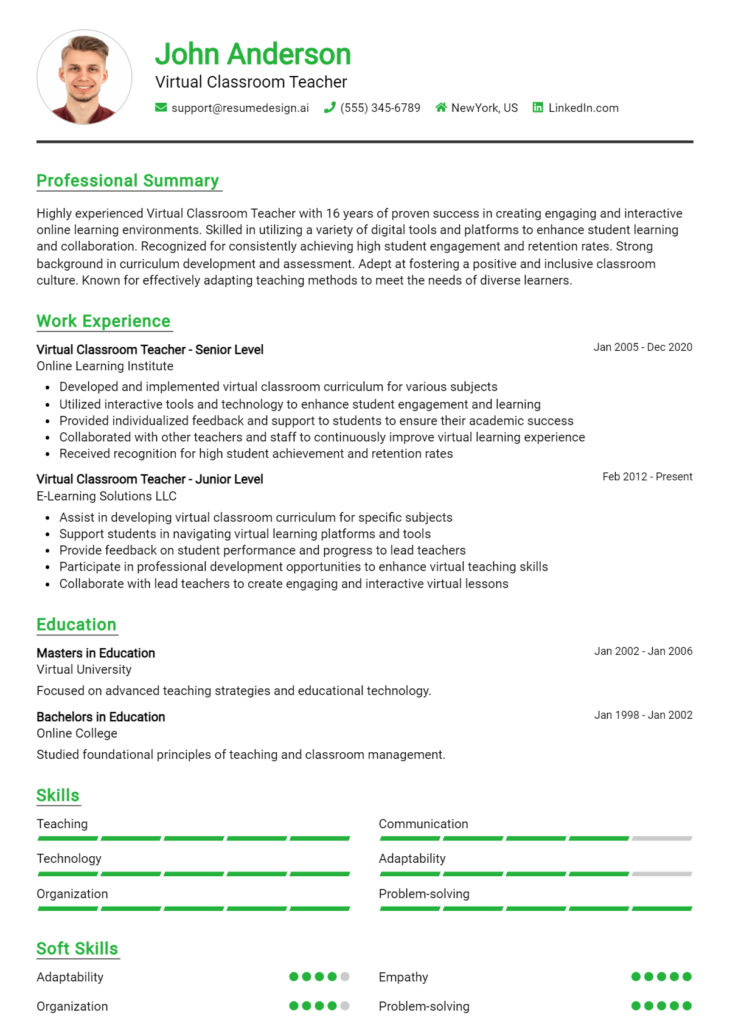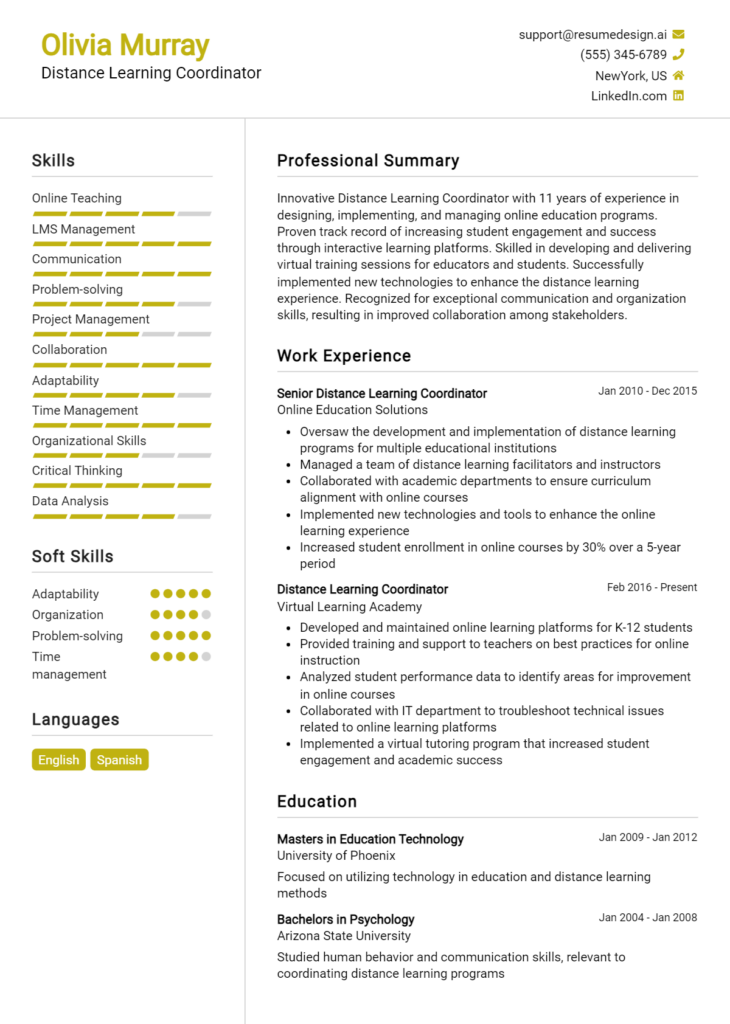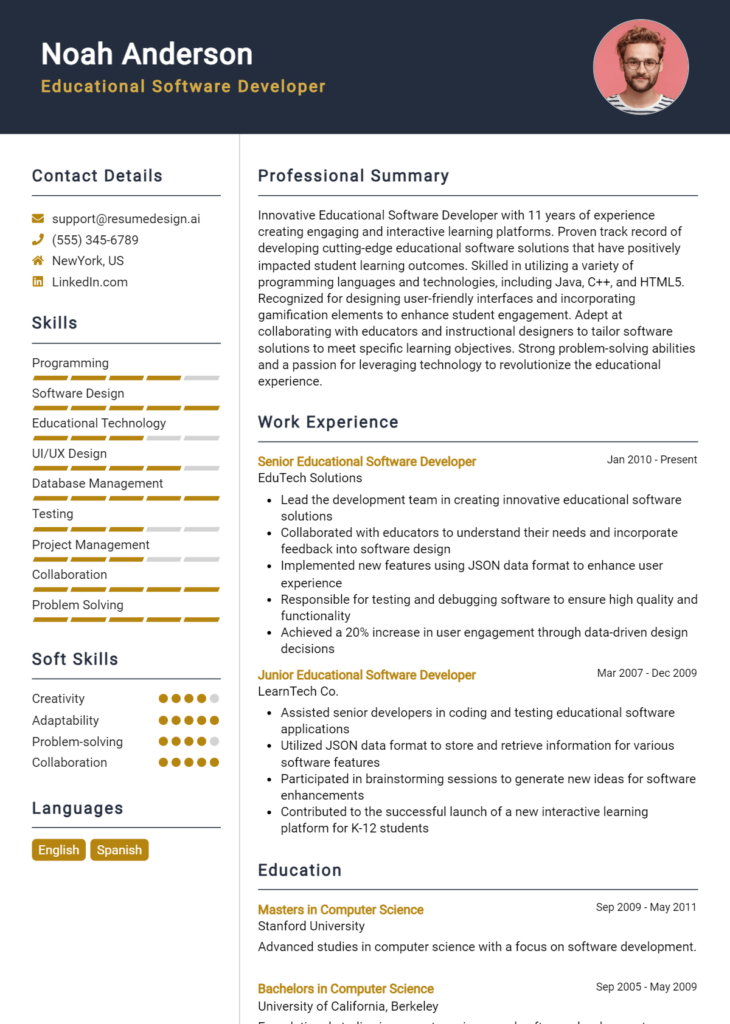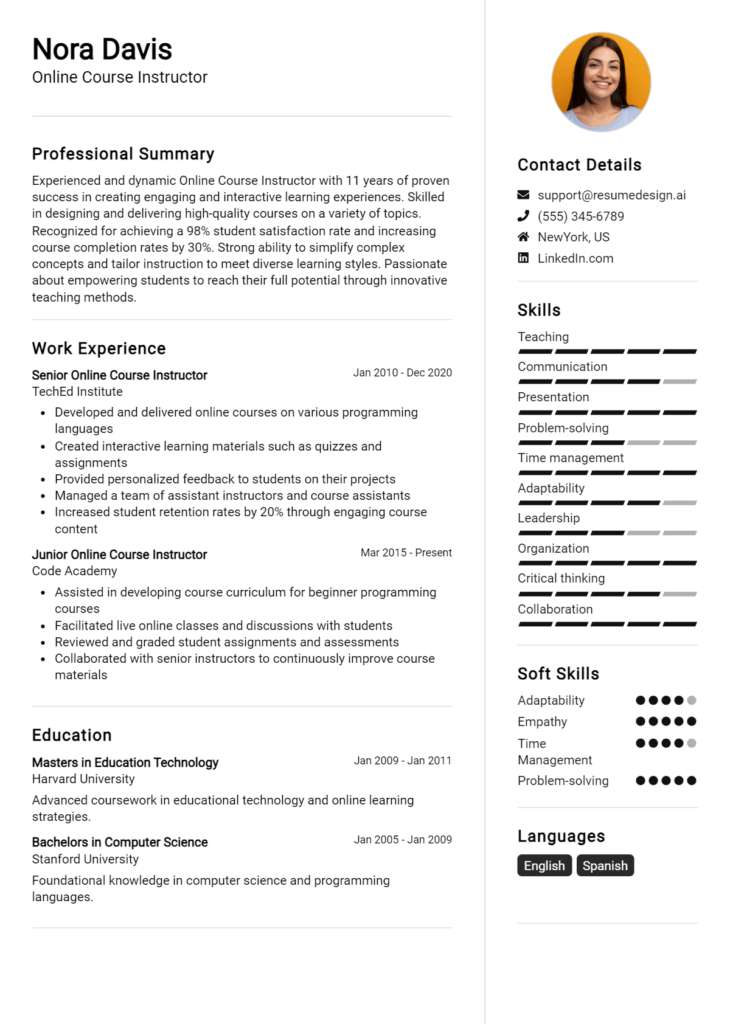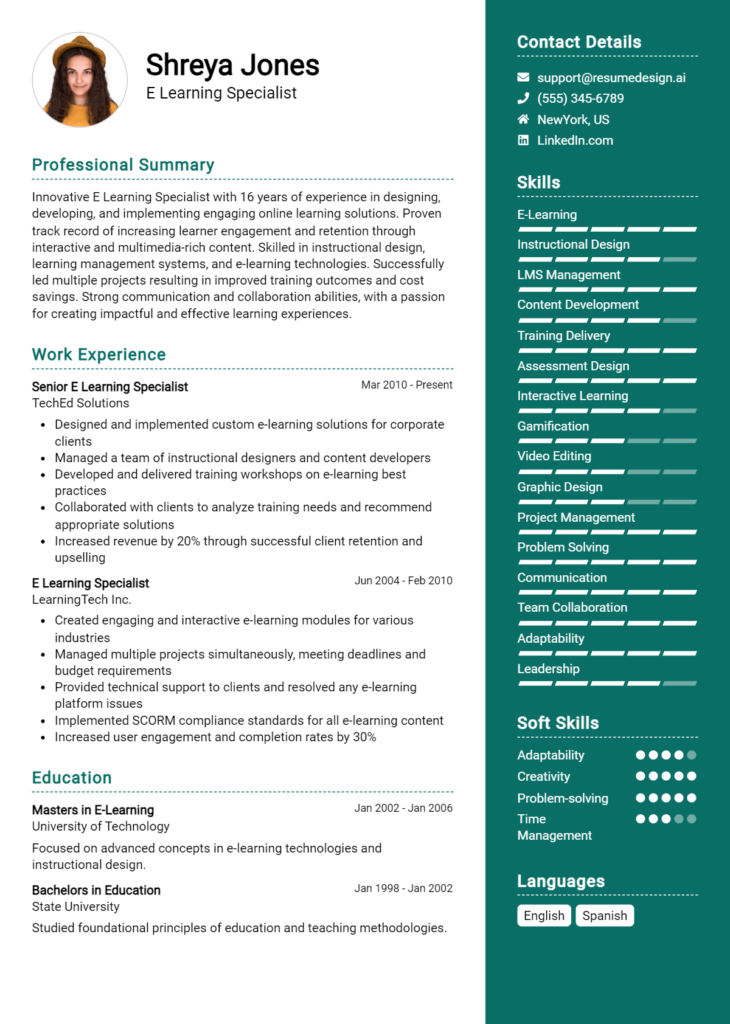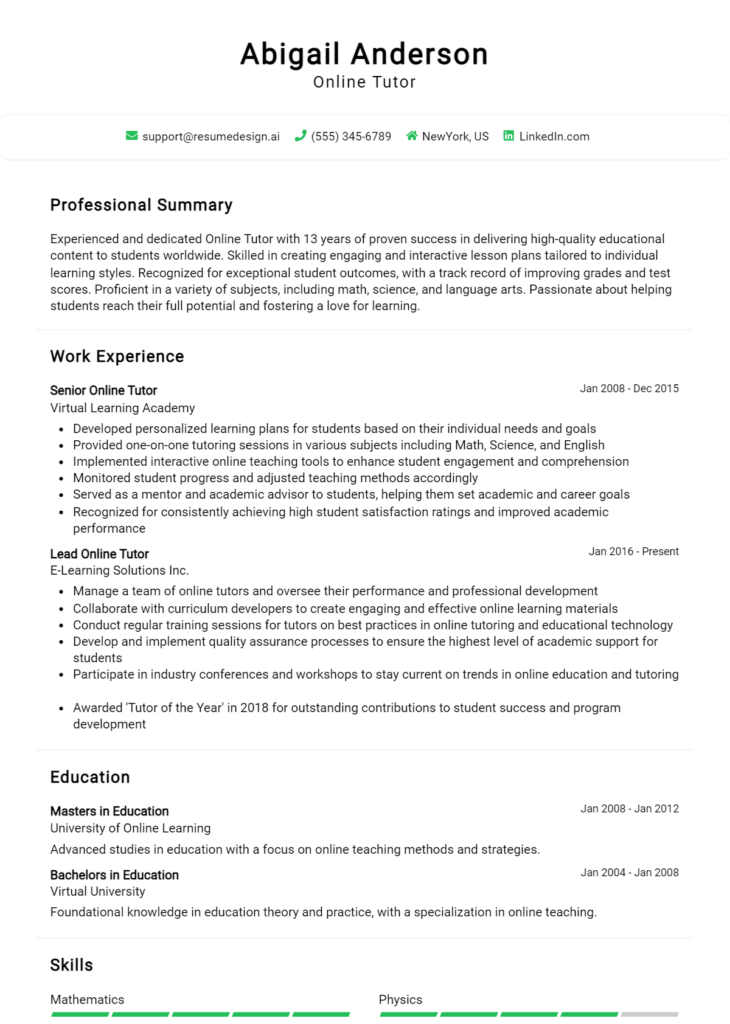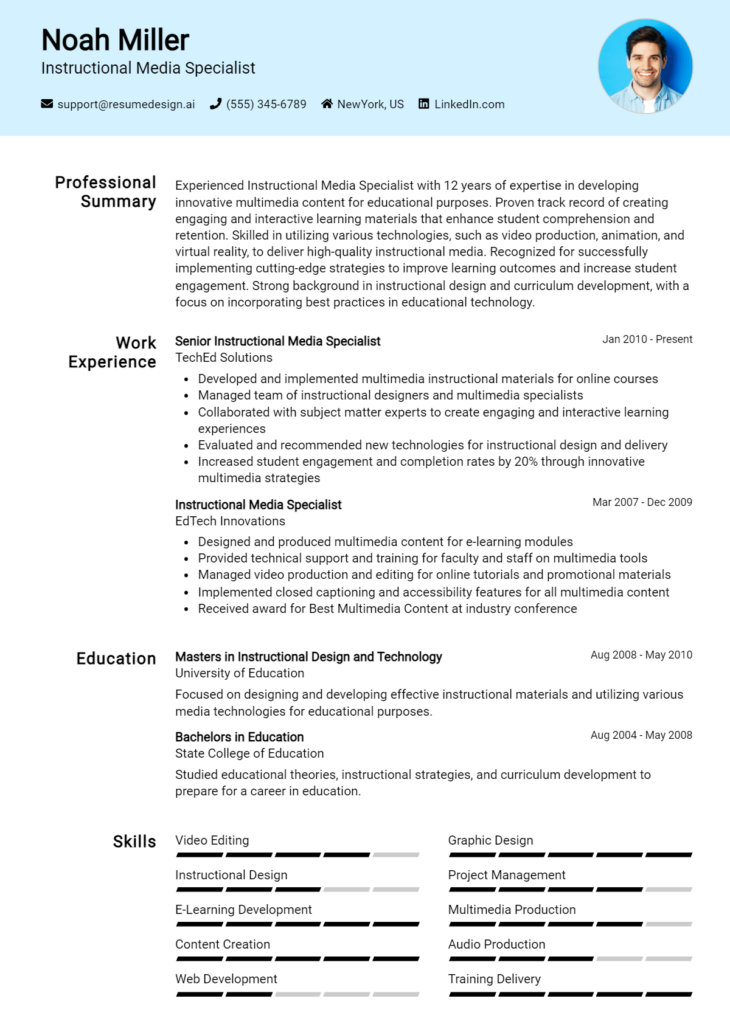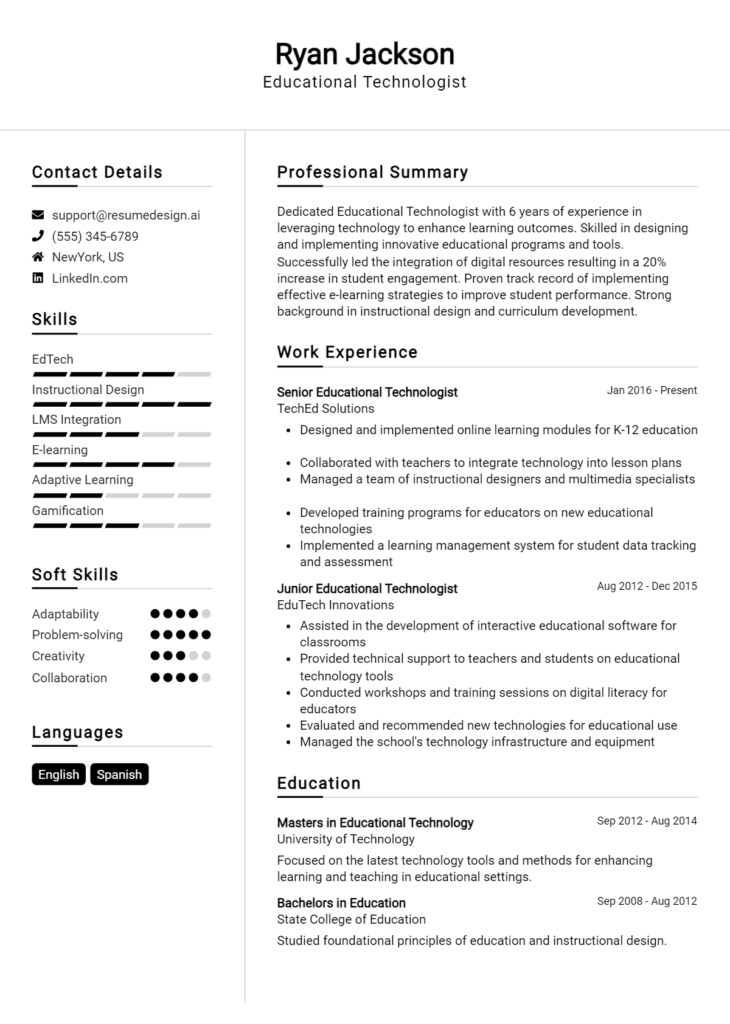Learning Management System Administrator Core Responsibilities
A Learning Management System Administrator plays a crucial role in the integration of educational technology across various departments, ensuring seamless access to training and development resources. Key responsibilities include managing LMS content, troubleshooting technical issues, and analyzing user data to enhance learning outcomes. Strong technical skills, operational knowledge, and effective problem-solving abilities are essential for success in this role. These competencies contribute significantly to the organization's goals by fostering an environment of continuous learning. A well-structured resume can effectively highlight these qualifications, demonstrating the candidate’s capability to bridge departmental functions.
Common Responsibilities Listed on Learning Management System Administrator Resume
- Manage and maintain the Learning Management System (LMS) platform.
- Design, develop, and upload course content and materials.
- Provide technical support and training for LMS users.
- Monitor user engagement and analyze training data for improvements.
- Collaborate with instructional designers to enhance course offerings.
- Ensure compliance with organizational policies and standards.
- Facilitate user account management and permissions.
- Develop and implement LMS best practices and procedures.
- Coordinate with IT for system upgrades and maintenance.
- Prepare reports on training programs and user activity.
- Assist in troubleshooting system issues and implementing solutions.
- Stay updated on industry trends and emerging technologies in learning management.
High-Level Resume Tips for Learning Management System Administrator Professionals
A well-crafted resume is essential for Learning Management System Administrator professionals, as it serves as the first impression a candidate makes on potential employers. In a competitive job market, your resume must not only highlight your skills and accomplishments but also convey your understanding of the intricacies of learning management systems. A strong resume can set you apart from other candidates, demonstrating your ability to manage and optimize these critical platforms effectively. This guide will provide practical and actionable resume tips specifically tailored for Learning Management System Administrator professionals to help you create a compelling document that showcases your expertise.
Top Resume Tips for Learning Management System Administrator Professionals
- Tailor your resume to the specific job description by incorporating keywords and phrases from the posting.
- Highlight relevant experience in managing Learning Management Systems (LMS), including specific platforms you have worked with.
- Quantify your achievements where possible, such as the number of users supported or the percentage increase in course completion rates.
- Showcase your technical skills, including proficiency in LMS software, data analysis tools, and e-learning development software.
- Include certifications and training relevant to instructional design and LMS management, as these enhance your credibility.
- Demonstrate your understanding of adult learning principles and instructional design methodologies.
- Utilize bullet points for clarity and conciseness, focusing on action verbs to describe your responsibilities and achievements.
- Incorporate any experience with user support, training, or onboarding, as these are critical aspects of the LMS role.
- Keep your resume format professional and clean, ensuring it is easy to read and well-organized.
By implementing these tips, you can significantly enhance your resume's effectiveness, increasing your chances of landing a job in the Learning Management System Administrator field. A strong resume that reflects your skills, accomplishments, and understanding of the role will make a lasting impression on potential employers, setting the stage for further discussions and opportunities.
Why Resume Headlines & Titles are Important for Learning Management System Administrator
In the competitive field of Learning Management System Administration, a well-crafted resume headline or title serves as a critical first impression for potential employers. This succinct phrase can capture the essence of a candidate's qualifications and expertise, immediately grabbing the attention of hiring managers who sift through numerous applications. A strong headline not only highlights key skills and experiences but also aligns perfectly with the specific role being applied for, making it easier for recruiters to see the value a candidate can bring to their organization. To be effective, these headlines should be concise, relevant, and tailored to the job description, ensuring they resonate with the needs of the employer.
Best Practices for Crafting Resume Headlines for Learning Management System Administrator
- Be concise: Keep the headline brief, ideally within 8-12 words.
- Use specific keywords: Incorporate terms relevant to the Learning Management System field.
- Highlight core competencies: Focus on your strongest skills and experiences that relate to the role.
- Tailor to the job description: Customize the headline for each application to reflect the specific job requirements.
- Include measurable achievements: If possible, mention quantifiable outcomes from previous roles.
- Avoid jargon: Use clear and straightforward language that can be understood easily.
- Showcase relevant certifications: If applicable, include certifications that bolster your qualifications.
- Maintain professionalism: Ensure the tone is formal and aligns with industry standards.
Example Resume Headlines for Learning Management System Administrator
Strong Resume Headlines
"Experienced LMS Administrator with Proven Track Record in E-Learning Solutions"
“Certified Learning Management System Specialist Focused on User Engagement and Retention”
“Results-Driven LMS Professional with 5+ Years in Developing Interactive Learning Experiences”
“Innovative Learning Management System Administrator Skilled in Data Analysis and Reporting”
Weak Resume Headlines
“LMS Administrator Looking for New Opportunities”
“Experienced Professional in Education”
Strong resume headlines effectively convey a candidate's unique strengths and qualifications, making it easy for hiring managers to quickly assess fit for the role. They utilize specific language that illustrates expertise and accomplishments, while also aligning directly with the job description. In contrast, weak headlines tend to be vague, lacking specificity and impact, which can leave a hiring manager uninspired or uncertain about the candidate's capabilities. A compelling headline can set the tone for the entire resume, inviting further exploration of the candidate’s qualifications.
Writing an Exceptional Learning Management System Administrator Resume Summary
A well-crafted resume summary is crucial for a Learning Management System (LMS) Administrator, as it serves as the first impression for hiring managers. This brief section is your chance to distill your most relevant skills, experiences, and accomplishments into a compelling snapshot. A strong summary quickly captures attention by presenting key qualifications that align with the job requirements, demonstrating your value as a candidate. It should be concise, impactful, and tailored specifically to the job you are applying for, setting the stage for the details that follow in your resume.
Best Practices for Writing a Learning Management System Administrator Resume Summary
- Quantify achievements: Use numbers and metrics to demonstrate your impact, such as the number of courses managed or user engagement rates.
- Focus on skills: Highlight the most relevant skills related to LMS administration, such as system implementation, user training, and analytics.
- Tailor the summary: Customize your summary for each job application by aligning it with the specific job description and requirements.
- Be concise: Aim for a summary length of 3-5 sentences that convey your value succinctly.
- Use action verbs: Start sentences with strong action verbs to convey your proactive approach and accomplishments.
- Include relevant certifications: Mention any certifications or training that are pertinent to the LMS field to enhance credibility.
- Showcase soft skills: Include soft skills such as communication, problem-solving, and teamwork that are essential for collaboration in an LMS environment.
- Highlight industry knowledge: Briefly mention your familiarity with industry trends or specific LMS platforms to position yourself as a knowledgeable candidate.
Example Learning Management System Administrator Resume Summaries
Strong Resume Summaries
Dynamic LMS Administrator with over 5 years of experience in developing and managing e-learning programs, achieving a 40% increase in user engagement through targeted training initiatives and streamlined course delivery.
Results-driven professional skilled in LMS implementation and user support, successfully launching a new platform that improved training completion rates by 35% while reducing operational costs by 20%.
Detail-oriented Learning Management System Administrator with expertise in data analytics and reporting, having optimized course offerings resulting in a 50% boost in learner satisfaction scores and a 30% increase in course enrollments.
Weak Resume Summaries
Experienced in managing learning systems and helping users.
A dedicated professional with skills in training and e-learning.
The strong resume summaries effectively highlight specific accomplishments, quantify results, and demonstrate direct relevance to the LMS Administrator role. They provide concrete examples of how the candidates have positively impacted organizations. In contrast, the weak summaries are vague, lacking detail and measurable outcomes, making it difficult for hiring managers to gauge the candidates' qualifications and potential contributions to the organization.
Work Experience Section for Learning Management System Administrator Resume
The work experience section is a critical component of a Learning Management System Administrator resume, as it serves as a platform for candidates to demonstrate their technical skills and managerial capabilities. This section not only highlights the candidate's ability to manage and enhance learning platforms but also showcases their commitment to delivering high-quality educational products. By quantifying achievements and aligning their experiences with industry standards, candidates can effectively communicate their value to potential employers and stand out in a competitive job market.
Best Practices for Learning Management System Administrator Work Experience
- Utilize specific metrics to quantify achievements, such as user engagement rates and course completion statistics.
- Highlight technical skills relevant to LMS platforms, including proficiency in software tools and programming languages.
- Showcase leadership roles in team projects, demonstrating your ability to guide and support colleagues.
- Include examples of successful collaborations with instructional designers and subject matter experts.
- Focus on problem-solving experiences that led to improved user experiences or streamlined processes.
- Align your work experience with industry best practices and emerging trends in educational technology.
- Use action verbs to convey a sense of initiative and impact in your roles.
- Tailor your work experience to reflect the job description and requirements of the position you are applying for.
Example Work Experiences for Learning Management System Administrator
Strong Experiences
- Led a cross-functional team to implement a new LMS, resulting in a 30% increase in course completion rates within the first six months.
- Developed and executed a training program for over 200 faculty members, enhancing their proficiency in LMS tools and increasing user satisfaction scores by 25%.
- Collaborated with IT to integrate advanced analytics into the LMS, allowing for data-driven decision-making and improving student engagement metrics by 40%.
- Managed the migration of over 500 courses to a new platform, ensuring zero downtime and maintaining a 98% satisfaction rate from users during the transition.
Weak Experiences
- Worked on the LMS project and helped with some tasks.
- Assisted in managing user accounts and provided support.
- Participated in a few meetings about LMS improvements.
- Involved in training staff on the system and did my best to help.
The experiences labeled as strong are characterized by clear, quantifiable outcomes and specific contributions that demonstrate leadership and collaboration, showcasing the candidate's impact on the organization. In contrast, the weak experiences reflect vague responsibilities that lack measurable results or specific achievements, making it difficult for potential employers to assess the candidate's true capabilities and contributions to previous roles.
Education and Certifications Section for Learning Management System Administrator Resume
The education and certifications section of a Learning Management System Administrator resume is crucial for demonstrating the candidate's foundational knowledge and commitment to professional growth. This section not only showcases the academic background but also highlights industry-relevant certifications and continuous learning efforts that are essential for managing and optimizing learning platforms. By providing details on relevant coursework, specialized training, and credentials, candidates can significantly enhance their credibility and alignment with the requirements of the job role, making them more appealing to potential employers.
Best Practices for Learning Management System Administrator Education and Certifications
- Prioritize relevant degrees, such as in Educational Technology, Instructional Design, or Information Systems.
- List industry-recognized certifications like Certified Professional in Learning and Performance (CPLP) or specific LMS certifications (e.g., Moodle, Canvas).
- Include any specialized training programs that enhance skillsets related to LMS administration and e-learning development.
- Provide detailed information on relevant coursework, particularly those that align with LMS functionalities and user experience design.
- Highlight advanced degrees (e.g., Master's or Ph.D.) that demonstrate a higher level of expertise in relevant fields.
- Regularly update this section to reflect newly acquired certifications or educational achievements.
- Consider including continuing education credits or workshops that contribute to ongoing professional development.
- Use clear formatting to ensure easy readability and quick identification of key qualifications.
Example Education and Certifications for Learning Management System Administrator
Strong Examples
- M.A. in Educational Technology, University of XYZ, 2022
- Certified Professional in Learning and Performance (CPLP), 2023
- Certificate in Instructional Design from ABC Institute, 2021
- Completed coursework in User Experience Design and Learning Analytics, 2020
Weak Examples
- B.A. in History, University of ABC, 2015
- Certification in Basic Computer Skills, 2019
- Online Course in Public Speaking, 2020
- High School Diploma, 2010
The strong examples are considered effective because they directly relate to the skills and knowledge required for a Learning Management System Administrator, showcasing advanced degrees and relevant certifications that emphasize the candidate's expertise. Conversely, the weak examples lack relevance to the role, featuring outdated or unrelated qualifications that do not convey the candidate's suitability for the position, thereby potentially diminishing their appeal to employers.
Top Skills & Keywords for Learning Management System Administrator Resume
In the competitive landscape of e-learning and corporate training, the role of a Learning Management System (LMS) Administrator is critical in ensuring that educational programs run smoothly and effectively. A well-crafted resume for this position must highlight both hard and soft skills to demonstrate a candidate's capability in managing and optimizing LMS platforms. Skills not only showcase technical proficiency but also underline interpersonal qualities that are essential for collaboration, problem-solving, and user support. By aligning skills with job requirements, candidates can create a compelling narrative that enhances their appeal to potential employers.
Top Hard & Soft Skills for Learning Management System Administrator
Soft Skills
- Communication
- Problem-solving
- Adaptability
- Attention to detail
- Team collaboration
- Time management
- User support and training
- Critical thinking
- Relationship building
- Customer service orientation
- Conflict resolution
- Project management
- Empathy
- Instructional design principles
- Creativity
Hard Skills
- LMS platform proficiency (e.g., Moodle, Blackboard, Canvas)
- Data analysis and reporting
- Course development and design
- HTML/CSS knowledge
- Learning analytics
- SCORM/AICC compliance
- System integration and API usage
- User management and access controls
- Troubleshooting and technical support
- E-learning authoring tools (e.g., Articulate Storyline, Adobe Captivate)
- Database management
- Cybersecurity awareness
- Knowledge of instructional technologies
- Content management systems (CMS)
- Familiarity with web-based applications
- Software installation and upgrades
For more information on how to effectively highlight your skills and work experience, consider utilizing various strategies and examples that resonate with the demands of the Learning Management System Administrator role.
Stand Out with a Winning Learning Management System Administrator Cover Letter
I am excited to apply for the Learning Management System Administrator position at [Company Name], as advertised on [Job Board/Company Website]. With a robust background in educational technology and a passion for enhancing the learning experience through effective systems management, I am confident in my ability to contribute positively to your team. With [X years] of experience in managing and optimizing learning management systems (LMS), I have developed a keen understanding of how to align technology with educational goals to facilitate impactful learning environments.
In my previous role at [Previous Company Name], I successfully implemented [specific LMS software, e.g., Moodle, Blackboard] across multiple departments, leading to a [specific percentage] increase in user engagement and course completion rates. My responsibilities included overseeing system configurations, user support, and training faculty and staff on best practices for utilizing the LMS. I pride myself on my ability to troubleshoot technical issues swiftly and efficiently, ensuring that all users have a seamless experience. Additionally, I have collaborated with instructional designers to create and refine online courses, making sure that the content is accessible and engaging for a diverse audience.
I am particularly drawn to the opportunity at [Company Name] because of your commitment to innovation in education and your focus on learner-centered approaches. I am eager to bring my expertise in data analytics to assess course performance and user engagement, allowing for continuous improvement of the LMS. I believe that my proactive approach to learning technology and dedication to supporting educators and learners alike would make me a valuable addition to your team.
Thank you for considering my application. I look forward to the opportunity to discuss how my background and skills can align with the goals of [Company Name]. I am excited about the possibility of contributing to an organization that values effective learning solutions and is committed to fostering a supportive educational environment.
Common Mistakes to Avoid in a Learning Management System Administrator Resume
When crafting a resume for the role of a Learning Management System (LMS) Administrator, it's crucial to present your skills and experiences in a way that highlights your expertise while avoiding common pitfalls. Many candidates unknowingly make errors that can detract from their qualifications, making it harder for hiring managers to see their potential. Here are some common mistakes to be aware of:
Generic Objectives: Using a vague objective statement that doesn't specify your goals or how you can contribute to the organization can make your resume blend in with others. Tailor your objective to reflect the specific role and organization.
Ignoring Keywords: Failing to incorporate relevant keywords from the job description can result in your resume being overlooked by applicant tracking systems (ATS) or hiring managers. Ensure you include terms like "LMS administration," "e-learning," and "training management."
Overloading with Technical Jargon: While it's important to demonstrate your technical expertise, using excessive jargon can confuse readers. Strike a balance by explaining technical skills in a way that is accessible to non-technical stakeholders.
Neglecting Soft Skills: Focusing solely on technical capabilities can give the impression that you lack interpersonal skills. Highlight soft skills like communication, collaboration, and problem-solving, which are essential for an LMS Administrator.
Lack of Quantifiable Achievements: Listing responsibilities without showcasing achievements can weaken your resume. Use metrics and specific examples to demonstrate how you improved processes or contributed to the success of previous projects.
Formatting Issues: Poor formatting can make your resume difficult to read. Ensure a clean, professional layout with consistent fonts, headings, and bullet points, making it easy for hiring managers to scan your information quickly.
Omitting Relevant Experience: Leaving out internships, volunteer work, or freelance projects that relate to LMS administration can limit your perceived qualifications. Include all relevant experiences that demonstrate your skills and knowledge in the field.
Failing to Customize Each Application: Sending out a one-size-fits-all resume can be detrimental. Tailor your resume for each application by emphasizing the experiences and skills that align with the specific job requirements.
Conclusion
As a Learning Management System Administrator, you play a crucial role in managing and optimizing online learning platforms, ensuring that educational content is delivered effectively and efficiently. The responsibilities typically include overseeing system functionality, troubleshooting technical issues, and providing user support to both instructors and learners. Additionally, you are tasked with analyzing user engagement data to continuously improve the learning experience.
In today’s competitive job market, having a well-crafted resume that highlights your skills and achievements is essential. A strong resume not only showcases your technical expertise but also your ability to align educational technology with organizational goals.
To ensure your resume stands out, consider utilizing various tools available for job seekers. Explore resume templates to find a layout that suits your professional style. Use the resume builder to create a polished document easily and efficiently. Check out resume examples for inspiration and ideas on how to present your experience effectively. Don’t forget to prepare a compelling cover letter using cover letter templates to complement your resume.
Take the time to review and refine your Learning Management System Administrator resume today. The right tools are at your fingertips to help you craft a document that captures your qualifications and sets you apart from the competition. Start enhancing your resume now!

